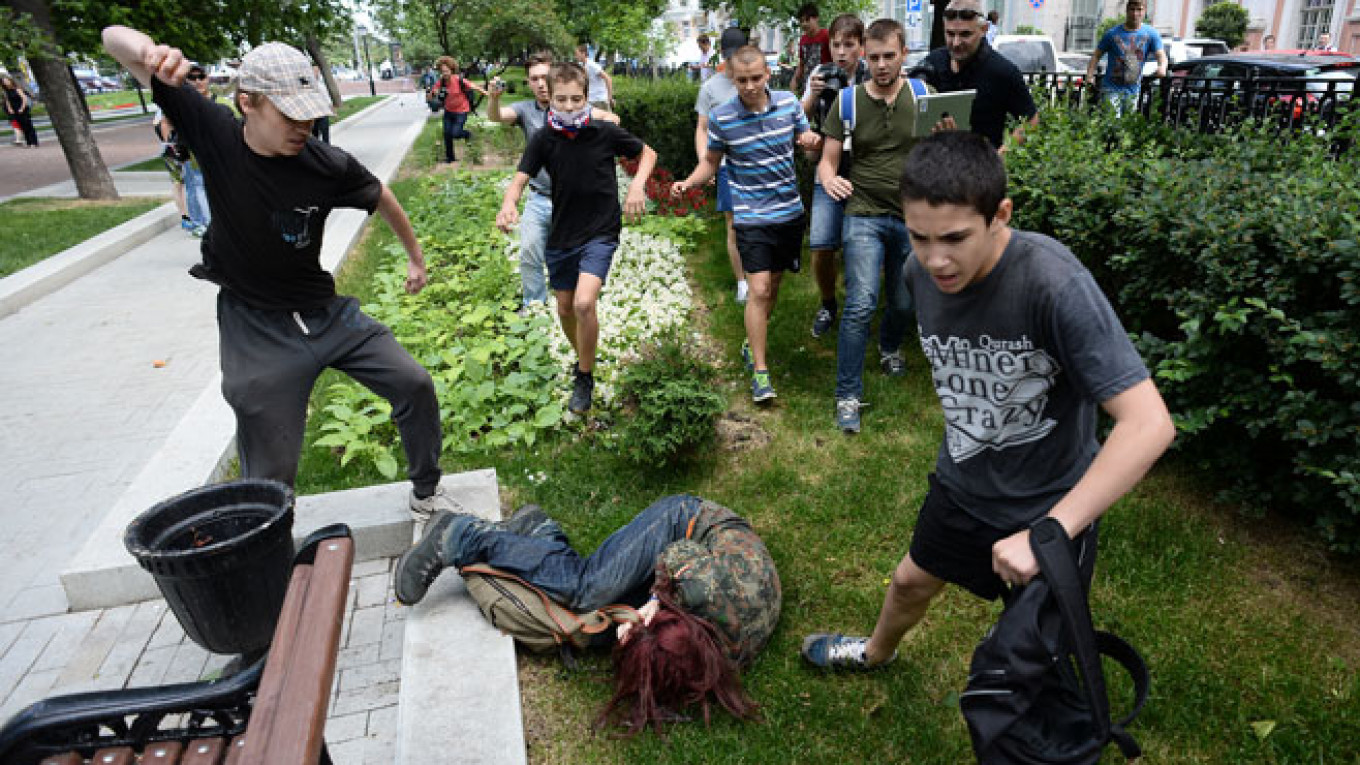*Correction appended
Russia's controversial law against gay propaganda has become a "license to harm" for Russian homophobes, who have expanded to target closeted gays, a new study says.
"License to Harm" is the title of a new report on gay rights in Russia, which was presented by Human Rights Watch in Moscow on Monday.
The study examined 78 cases of attacks on gay, lesbian, bisexual and transgender (LGBT) people across 16 cities in Russia since 2012. The list includes verbal harassment and rights violations such as firings over sexual orientation, but physical violence dominated.
The abuse detailed in the report went beyond beatings: Documented cases include a gay person who was forced to sodomize himself with a bottle by homophobic attackers, and a transgender woman who was stripped naked and abandoned in a forest — after her big toenails were torn out with pliers.
Most victims said anti-gay violence had intensified since the law against "gay propaganda" was passed in 2013.
Formally, the law is limited to minors, with anyone found guilty of informing them that LGBT relations are "of equal social worth with traditional relations" facing fines.
Yet, homophobes across the nation have taken it as carte blanche to conduct a hate campaign, Human Rights Watch representatives said at the study's presentation in Moscow.
"Pressure increased on LGBT [people] and defenders of their rights," said the group's Russia researcher, Tanya Cooper. "It's a campaign of harassment and intimidation."
There are no comprehensive statistics for the number of LGBT people in Russia, a country of 146 million, or for attacks on them nationwide.
A study by anti-xenophobia watchdog Sova listed 27 attacks over last year, but that figure was based solely on media reports.
A polling of experts and LGBT representatives showed that the attacks had changed in nature in the 18 months since the law's passing, the study said.
Before the law, homophobes focused on open activists staging or attending LGBT festivals or gay pride rallies, said Ksenia Kirichenko of Vykhod ("Coming Out"), a group providing legal aid to LGBT people.
But now they also target people who try to keep their sexual identity hidden, Kirichenko told The Moscow Times at the study's presentation.
A case in point was the firing of a closeted lesbian teacher in a school for disabled children in St. Petersburg earlier this month. The woman was forcibly outed by an anti-gay activist and promptly fired for "moral misconduct," the first such case in Russia.
The attackers include both Christian conservatives and poor working-class teenagers who are more interested in violence than ideology, Kirichenko said.
The latter are prominent in the Occupy Pedophilia movement, a vigilante group whose activists have documented on video hundreds of instances of brutal abuse against alleged gays and child abusers throughout Russia.
Authorities, meanwhile, have gone out of their way to downplay any spike in violence against LGBT people.
Prosecutors and security services refuse to track statistics for homophobic attacks or register them as hate crimes, Cooper said.
The bill's backers, all the way up to President Vladimir Putin, have repeatedly denied that it is discriminatory, saying it is aimed only at "protecting Russian children."
The Kremlin has embraced ultraconservative rhetoric since 2012 in a bid to rally supporters in the face of mounting political dissent and, more recently, an economic crisis.
The Prosecutor General's Office and the Investigative Committee did not return separate requests for comment Monday.
But Russia's gay basher par excellence, St. Petersburg lawmaker Vitaly Milonov, was unfazed.
"If Human Rights Watch is against the law, that means we must keep it," Milonov told The Moscow Times.
The conservative lawmaker, who pioneered the "anti-gay law," accused the New York-headquartered watchdog of being a "political call girl."
Milonov — who just last weekend crashed a hedonist party in a St. Petersburg gay club (disrupting, but failing to cancel it) — also denied any increase in homophobic attacks.
"Oh please," he said by telephone. "I can't shut down a single fa--ot club, and they're everywhere on TV."
"I wish I were 'oppressed' like they are," Milonov said.
Contact the author at a.eremenko@imedia.ru?
An earlier version of this article reported that a gay woman had been stripped naked and abandoned in a forest by her attackers.
A Message from The Moscow Times:
Dear readers,
We are facing unprecedented challenges. Russia's Prosecutor General's Office has designated The Moscow Times as an "undesirable" organization, criminalizing our work and putting our staff at risk of prosecution. This follows our earlier unjust labeling as a "foreign agent."
These actions are direct attempts to silence independent journalism in Russia. The authorities claim our work "discredits the decisions of the Russian leadership." We see things differently: we strive to provide accurate, unbiased reporting on Russia.
We, the journalists of The Moscow Times, refuse to be silenced. But to continue our work, we need your help.
Your support, no matter how small, makes a world of difference. If you can, please support us monthly starting from just $2. It's quick to set up, and every contribution makes a significant impact.
By supporting The Moscow Times, you're defending open, independent journalism in the face of repression. Thank you for standing with us.
Remind me later.


